“New Ground”
Written by Sara Charno & Stuart Charno and Grant Rosenberg
Directed by Robert Scheerer
Season 5, Episode 10
Production episode 40275-210
Original air date: January 6, 1992
Stardate: 45376.3
Captain’s Log: The Enterprise is testing a new technology called a soliton wave, which could revolutionize space travel. Worf is contacted by his mother, who is on a transport with his son, Alexander. Helena and Alexander beam on board. Alexander makes it clear that he has no intention of going back to live with the Rozhenkos. Worf brings his mother to Ten-Forward. Helena explains that she and Sergey are too old to care for a boy as energetic and willful as Alexander. He needs his father.
Reluctantly, Worf agrees. Helena goes back to Earth on the transport, and Worf tries to talk to Alexander, and it’s the world’s most awkward conversation. Worf enrolls Alexander in the school. As the teacher, Ms. Kyle, fills out the form with his information, Alexander refuses to engage with Kyle at all, and then is disgusted to learn that Worf has no idea what Alexander’s date of birth is. (Of course, he wasn’t there for that, and didn’t even know he and K’Ehleyr had a child until Alexander was old enough to walk…)
Worf is late for a meeting with Picard, which is then interrupted by assorted bits of paperwork related to Alexander, leading Picard to shoo Worf away to take care of his son. He’s not the first officer on the Enterprise to have a new family member on board, after all.
The senior staff meets with Dr. Ja’Dar, who explains how the test run of the soliton wave will work. Afterward, Troi talks to Worf about Alexander being enrolled in Kyle’s class, and mentions the father-son field trip. Worf says he won’t be able to attend due to a personnel review, but after Troi nudzhes him, he reluctantly agrees to reschedule the review so he can go along.
The trip is to the ship’s bio-lab, which is at least partly the equivalent of a natural history museum, with many displays of animals of various kinds. In particular, she shows off the two Corvan gilvos, of which there are only fourteen left. The Enterprise is transporting these two to Brentalia in the hopes of eventually repopulating the species.
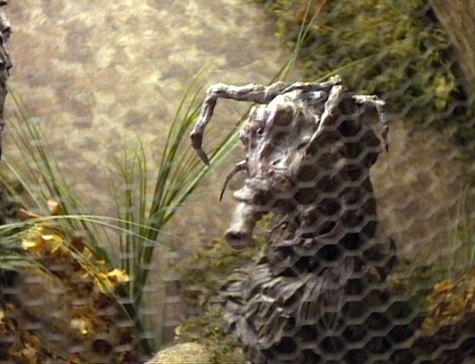
The kids are left to their own to check out the place, and Kyle tells Alexander that he wasn’t supposed to take the models that were there for all the kids to play with. Alexander says he didn’t steal the lizard, but Worf finds it in Alexander’s pocket. Worf brings him back to their quarters and lectures him about how important a Klingon’s honor is. A Klingon’s word is his bond, he explains, and without it, he’s nothing.
Worf asks why Alexander lied, and he gives the classic little-kid answer of “I don’t know.”
He sits down with Alexander and says that when he was a boy, he lost everything—his parents, his people—so all he had left was his honor. He shows Alexander the statue he keeps on the table in his quarters, which, it turns out, is of Kahless and his brother Morath, who fought for twelve days and twelve nights, because Morath lied and brought shame to their family.
Alexander promises never to lie or steal again. Worf, rather naïvely, says he accepts Alexander’s word, and they will never speak of it again.
Troi asks how the field trip went, and Worf explains about the incident. Worf seems to think it’s the end of it, but Troi thinks he’s being optimistic. Worf, however, insists that this will not be a problem again. And everyone in the audience who’s ever dealt with little kids is just snickering…
They arrive at the bridge, where it’s time to test the soliton wave. The wave hits the test ship and takes it into warp. The Enterprise follows, getting within twenty kilometers of the test ship, which is at warp 2.35—faster than expected, but within mission parameters.
Unfortunately, the wave becomes unstable. The wave expands, becomes less efficient in transferring power, eventually destroying the test ship and damaging the Enterprise, taking out sensors and reducing shield efficiency. Hey, this is why you have test run, so things can go horribly wrong.
Worf meets with Kyle, who explains that Alexander is very bright—but he’s aggressive, inattentive, and is still stealing and still lying. Worf is dismissive of Kyle’s concerns right up until he realizes that his brilliant lecture had no effect whatsoever. He storms out of the meeting, furious, and tracks down Alexander on the holodeck, confining him to quarters, and threatening to put him in a Klingon school.
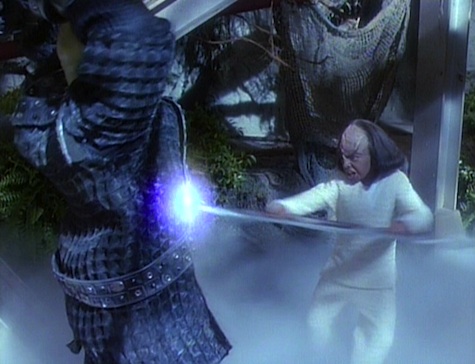
The Enterprise finally gets sensors back, and they find the soliton wave, which is now travelling at warp four, still on course for the colony where the scattering field will be employed to dissipate the wave. However, the wave has increased power to the point where it can’t be dissipated, and will in fact destroy the colony and the planet it’s on.
Worf, for what may be the first time since reporting on board the Enterprise, has a session with Troi in her office, explaining what he’s doing with Alexander. Troi, though, is more concerned with how it affects Worf. He says he was mainly concerned with what was best—he did not think he was capable of raising him properly alone and on a ship, and he knew the Rozhenkos could handle it, having already done so. Troi asks if he understood how Alexander felt about it—if he felt abandoned. He lost his mother and father all at once. Worf realizes that this feeling of abandonment might be why Alexander’s acting out now.
She asks Worf about his last conversation with K’Ehleyr. It was, naturally, an argument about Alexander, and Troi wonders if the anger of that argument led to his sending Alexander away.
A more thoughtful Worf goes to his quarters, where Alexander is packing. The boy insists that he’s being sent away because Worf doesn’t care about him. Before the argument can continue, he’s called to a meeting about the soliton wave. The best option is to go through the wave and take up position in front of it (the wave has grown too large to go around before it hits the colony), then fire photon torpedoes to disrupt it.
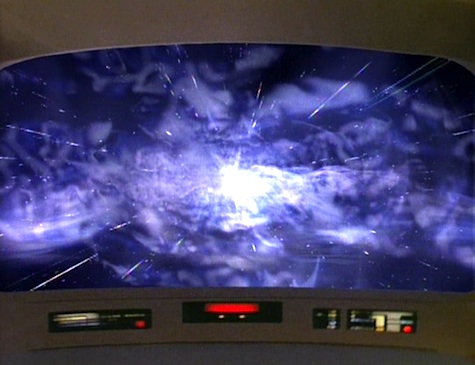
Riding through the wave proves bumpy, as the ship’s shields are not up to full power yet. Once they come out the other side, there’s some damage—no tractor beams or transporters, and there are gaps in the aft shields that will require several sections to be evacuated, as they’ll be hit with ion radiation when the torpedoes explode.
A fire breaks out in the bio-lab, and the fire suppression system is offline. Worf’s about to manually evacuate the air from the room, but there are life forms in there: not just the gilvos, but also Alexander, who disobeyed Worf again in order to go see the gilvos. They can’t transport him out, as transporters are still down, and that lab is one of the areas that is exposed by the gaps in the shields. The Enterprise is losing speed thanks to damage from the wave, so they have all of three minutes to get Alexander safely out before they have to fire the torpedoes.
Worf and Riker head to the lab—because, apparently, there are no security personnel on board trained to rescue people—and get the door open. They rescue Alexander and the gilvos in the nick of time.
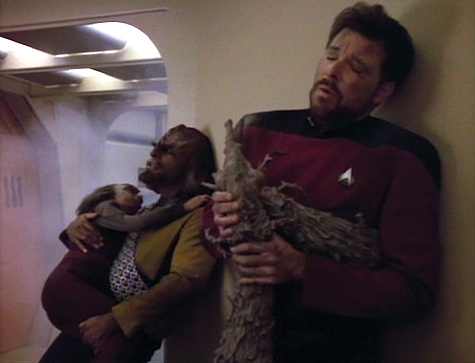
Alexander is suffering from a hairline fracture of the fibula (“That’s a bone in your leg,” Crusher explains helpfully) and smoke inhalation. Worf then challenges Alexander to stay on board the Enterprise. It won’t be easy for either of them—but he believes Alexnder’s mother would be pleased.
Can’t We Just Reverse the Polarity?: The soliton wave, in theory, would allow ships to travel faster than light without a warp engine: you just need a wave generator and something to dissipate the wave. In practice, of course, there are still bugs to be worked out, but it’s actually kind of a neat concept.
Thank You, Counselor Obvious: Troi takes an immediate interest in Worf’s travails with Alexander, which makes sense, since she is intimately familiar with how dreadful Worf would be at parenting. It takes Worf a little longer to come around to the notion, but he does eventually go to her for assistance.
There is No Honor in Being Pummeled: Worf for the first time has to deal with having a son, something he’s horribly ill-equipped to do, as he mistakes lecturing for parenting and assumes that Alexander is telling the truth when he so totally isn’t.
Also at the climax, Worf and Riker are both unable to move the beam that’s fallen over Alexander, so Riker goes to get something to lever it with. Then Alexander mutters that he’s scared, and suddenly Worf goes all Popeye-after-eating-spinach on the beam and lifts it all by himself. (The look Riker shoots him as he sees that and tosses away the pipe he was going to use as a lever is hilarious.)
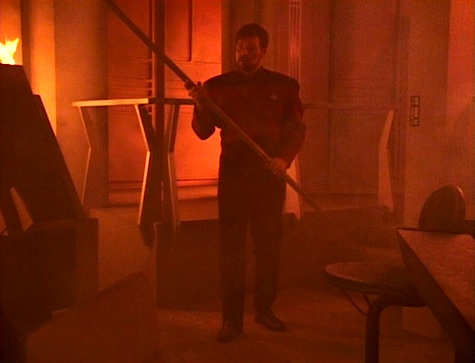
What Happens On the Holodeck Stays On the Holodeck: Alexander uses Worf’s calisthenics program, previously seen in “Where Silence Has Lease” and “The Emissary,” but uses the novice setting. He manages to kill the skull creature, and thinks Worf should be proud of him, but considering he took Worf’s bat’leth and went to the holodeck without permission, and this was right after Worf found out Alexander lied and stole again, Worf is less impressed than he might otherwise have been.
In the Driver’s Seat: Ensign Felton is back for the second week in a row, and gets to do some dangerous piloting through the wave.
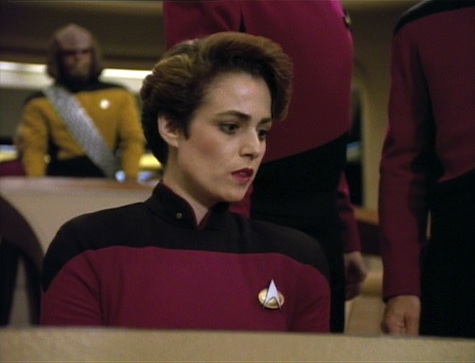
I Believe I Said That: “We are gonna see something that people will talk about for years! I mean, think about it, no more bulky warp engines or nacelles! A ships just generates a soliton wave and then rides it through space like a surfboard! This is gonna be like being there to watch Chuck Yeager break the sound barrier—or Zefram Cochrane engage the first warp drive!”
“It should be interesting.”
“Very exciting.”
“I’m talkin’ to the wrong crowd.”
La Forge getting all excited about the soliton wave, and the unemotional Data and the taciturn Worf’s lack of enthusiasm harshes his mellow.
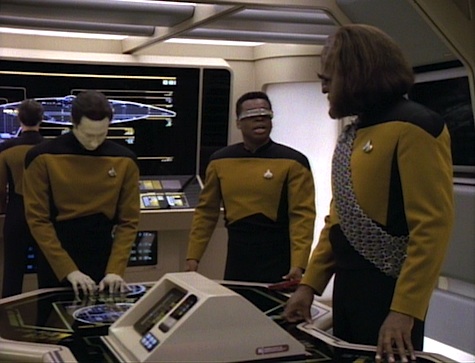
Welcome Aboard: Georgia Brown returns as Helena Rozhenko, having last appeared in “Family,” for what turned out to be her last role before she died in 1992. While the Rozhenkos will be mentioned many times again on both TNG and Deep Space Nine, this is the final onscreen appearance of either of them. Brian Bonsall takes over from Jon Steuer as Alexander, a role he will continue for the rest of TNG‘s run (Marc Worden will take over the role on DS9, and James Sloyan will play a time-traveling adult Alexander in “Firstborn”). Jennifer Edwards acts just like a teacher while playing Kyle (who’s referred to in the script as “Miss Kyle,” by Troi as “Mrs. Kyle,” and by Worf as “Ms. Kyle”), while Richard McGonagle is mostly harmless as Ja’Dar (he’ll return twice on Voyager as Commander Peter Harkins in the episodes “Pathfinder” and “Inside Man”), and Sheila Franklin is back for her second turn as Ensign Felton.
Trivial Matters: This episode establishes Alexander as a recurring character, as he will remain on board for the rest of TNG‘s run.
La Forge likens the soliton wave experiment to the breaking of the sound barrier and the first warp flight—thanks to time travel, he really will be there for the latter a few years hence, riding along with Zefram Cochrane in the Phoenix in Star Trek: First Contact.
This is the first time the statue in Worf’s quarters has been identified, and also the first time the story of Kahless’s brother Morath had been told. Morath would be mentioned again in “Firstborn” and on Voyager‘s “Barge of the Dead.” Michael Jan Friedman’s novel Kahless would show that the legend embellished somewhat on the real history of Kahless and Morath.
Another gilvo will be seen on DS9‘s “The Nagus.”
Make it So: “I accept your challenge.” I find myself more disposed toward this episode than I was when it first aired. For one thing, it brought back Helena Rozhenko, and the scenes with her and Worf are as magnificent as the ones in “Family.” Michael Dorn does such a great job of playing up Worf’s affection for his parents in subtle ways, and Georgia Brown is radiant as ever. For another, La Forge’s enthusiasm for the soliton wave is infectious.
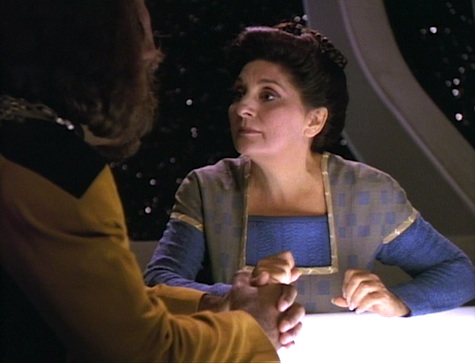
Plus, it always irritated me that they went to the trouble of establishing families on the Enterprise, and then did so very little with it. Crusher was the only one of the main cast to have a child on board, and they only spent two-and-a-quarter seasons together. Marrying off O’Brien and later giving him a kid helped address this, but so did bringing Alexander back in this episode.
Having said all that, the execution is still pretty dreadful. You can see the bright, neon numbers by which the episode was painted, as it hits every cliché in the book regarding difficult parenting (all the way down to the father threatening the son with military, er, that is, Klingon school).
And holy crap, is the crisis at the climax embarrassingly contrived. The damage just happens to take out the transporter, so they can’t use it to rescue Alexander from the bio-lab, which just happens to be in the area that just happens to be exposed by the gap in the shields, so our intrepid heroes only have minutes to save the boy! (And the endangered alien lizards. Riker’s initial reluctance to save what is a full 1/7th of the entire population of a species is kinda icky, but we’ll let that go.)
Finally, while this is hardly this episode’s fault, most of Alexander’s subsequent appearances on TNG would be some of the show’s most inept, embarrassing, and awful stories.
A good idea, sabotaged by just awful execution.
Warp factor rating: 4
Keith R.A. DeCandido never liked the character of Alexander, and yet had fun writing him in A Time for War, a Time for Peace and Articles of the Federation. Go fig’.










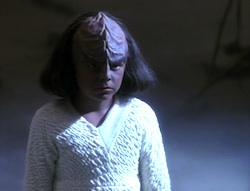
I am more generous with my grading than you are… I would give it a 6 or 7. I thought it was great idea to bring back Alexander. Like you touched on in the recap.. I thought the show needed more interaction with the crew’s families to give it some depth/diversity than just the weekly adventure/scifi story arc. and there is just something about Alexander and Worf’s interactions that I find hilarious even if they are predictable. Plus the enterprise is a surfboard.
Yeah I’d give it a 5. Lots of good, but nothing majorly groundbreaking. I agree that the “nick of time” rescue was a little contrived (and there’s NO WAY that whole scenario took only 3 minutes), but it was worth it for the part where Worf lifts the beam. Maybe I’m just a sucker for Father/Son relationship stories that end well.
Sad that this is the last time we’ll see Worf’s Mum. She really was a great character and well played by Georgia Brown.
I like the parts of this show, but I agree with Keith that the whole of it is some sort of train wreck. The starship Enterprise is helping out with a new form of warp travel- okay. Not sure why you need the biggest ship in the fleet and not the corp of engineers, but okay. Worf is going to be a father- I actually really like this storyline (besides the rapidly aging Alexander part, but I understand why that happens). I’m all about character development as a key to a good show and Worf probably undergoes more development in his 12 years than any other Trek character before or since. I even like Counselor Troi actually functioning as a counselor for once, instead of damsel in distress/reason to explain something in very simple concepts for the audience to grasp. But somehow despite all these good elements, the show just doesn’t quite work.
I agree the last scene seems a bit too contrived. And while I agree with you Keith that there should have been some security or engineering department personnel doing damage control/rescue, I get why Worf went- after all it’s his son and he’s trying to do the right thing.
I’m also confused as to why a ship which was designed for families isn’t a little more child proofed. For that matter, why is Alexander allowed to hang out by himself during a red alert situation (or any other situation for that matter). I know in the New Frontier series, there is a heavily armored daycare that all the children go to, but 4 year old Alexander is left in his room by himself? Why isn’t he being watched? Why do the doors open to let unaccompanied children roam the ship during emergency situations?
I feel like this is the real start of establishing Michael Dorn as one of the pre-eminant Trek actors (I rank him only behind Patrick Stewart and Brent Spiner on this show) and a huge step in making the Worf we see in the latter half of DS9 possible. But as an episode itself, it just falls short.
I was half expecting a “The Boy, Mark II” section starting up here…
I hated just about everything Alexander ever did. Him showing up in an episode was always very groan-worthy. He was always so much worse than Wes ever was.
“Jennifer Edwards acts just like a teacher while playing Kyle”
It’s funny that you note this, because when I watched this episode earlier this year, it actively annoyed me that she behaved like the stereotype of the (female) teacher: distressed and helpless in the face of a difficult child.
It didn’t strike me when I watched it the first time, but now that I work in a grade school, the stereotype kinda bothered me. The vast majority of teachers I see are much more pro-active in dealing with difficult students and their parents. I find it hard to believe that teachers working for Starfleet in TNG’s oh-so-enlightened age, would come off as so passive and bothered by (alien) behavior.
I never was able to remember that the Soliton Wave and the first “Alexander on the Enterprise” story were one and the same. It’s such a shame that the B-Stories often relied on MacGuffin’s of Science to be able to create drama for the A-Story. I mean, the Soliton wave is such a great piece of technology, but we just end up throwing it into that pile of “failed new propulsion technologies” that never seem to have any other application (at least for the Federation): Transwarp, Soliton Wave, Coaxial Induction Warp Drive, etc. The only one Starfleet got to work was the Quantum Slipstream Drive, and that’s only on one ship (U.S.S. Aventine) and it was done by David Mack for the Destiny Trilogy, not on any actual show. It’s like Starfleet is destined to have to adhere to that damnable Warp 5 speed limit from “Force of Nature” forever…
As for Alexander, I found him at times to be even more aggrivating than early Wesley stories. Simply because he has no filter, and is so damned precocious. I’d have loved for Picard to have had some time alone with Alexander, maybe straighten the kid out where Worf continued to fail. Though Worf isn’t always a terrible parent. As he mellowed out towards the end of DS9, his time with Kirayoshi O’Brien and his reconciliation with Alexander, showed that he would’ve been a pretty good dad (for a Klingon) had he actually sired a son or daughter with Jadzia. Frankly, I’d have liked to have it be a daughter. That would have brought out some interesting storylines…
In the end, all I really remember about this episode from my youth is that whenever I would see the word “Soliton Wave” in the Star Trek Encyclopedia, I always read it as “Solition Wave” and wondered why what it was trying to solve or sell to people.
@7: Actually the warp 5 limit was pretty much dropped after TNG; the behind-the-scenes justification for Voyager‘s nacelles raising up before they went into warp was that it was some kind of engine mod to correct the damaging aspects of warp drive (though if so, why not just build them in the raised position to start with?).
The soliton wave is a neat idea, a real physics concept that was handled fairly well in the script. Solitons are self-sustaining waves that don’t dissipate because they’re constrained by their conditions, like a wave in a canal that can travel for miles, a light pulse in a fiber-optic cable, or the Great Red Spot of Jupiter. I’m not quite sure how a soliton could survive in open space without external confinement, but I gather that some solitons are somehow self-sustaining by virtue of their geometry or what-have-you. So in concept it’s pretty neat. But two things totally ruin the execution. One is that stupid, stupid visual effects design that took the “wave” part way too literally and made it look like a glowing lasagna noodle undulating through space. Nothing about that made any sense. The other, of course, is that the technology was never mentioned again. Just because one test failed, that doesn’t mean the problems can’t be corrected.
I was never very fond of Alexander. The one time I think he worked as a character was in “Cost of Living,” but mainly because of his relationship with Lwaxana.
I read once (in the TNG Companion, most likely) that the statue of Kahless and Morath was a pre-existing prop that got Klingon foreheads added to it. I’m pretty sure I saw that prop as a set decoration in the 1968 Mission: Impossible 2-parter “The Contender,” so evidently it’s been in Paramount’s possession for a very long time.
Love the Rozhenkos. Right up there with the Cosbys in terms of “fictional parents you wish were yours.” And you’re right, Dorn plays his relationship with them perfectly.
I always liked Alexander, but know enough to be ashamed to admit that :) What can I say? There’s something undeniably adorable about a teeny little Klingon. And at least he had the excuse of age for his petulant behavior (the same cannot be said of Wes). I do heartily concur, however, that later episodes centered on him were terrible (a repressed memory of Troi attempting a cowgirl twang is struggling to surface…).
If you want to depress yourself, do an image search of Bonsall — there’s a great one out there (I think from TMZ, sheesh) that shows his disturbing progression of mug shots throughout the years. Oh to be a child actor…
Troi nudzhes him
nudges
(I have nothing relevant to say.)
Wow. Until I saw the image of Worf and his mother, I hadn’t realized how much she looked like Deanna.
Since that door has been opened, yes… episodes with Alexander do tend towards the cringe-worthy side, but his interaction with Troi’s mother yeilds one of the most touching moments with her character, ever. More on that, though, when we get there.
Ivory Tower: Feh — “nudzh” is the preferred Yiddish spelling. Preferred by me, anyhow. Nyah nayh.
—Keith R.A. DeCandido
I like the idea of Worf dealing with being a father more than I liked the execution. They tried too hard to make it cute.
Not that I’m opposed to cuteness in Trek, it’s just some things don’t work well when played that way.
I can’t stand Alexander. I think the actor who plays him — from this episode on anyway — is terrible. It also seems weird to me that they essentially put a white kid in blackface instead of just casting a black or mixed-race actor.
The tng Klingons becoming noble savages talking about “honor” evrey word was never somthing I liked but add a cloying child and i’m just done.
jec81: Erm, this is an odd time to be complaining about white actors in dark makeup playing Klingons, considering that they’ve had white guys playing Klingons since 1967. In fact, it took 20 years for anyone to think of casting black actors, as Michael Dorn was the first Klingon to be played by a dark-skinned person. John Colicos, William Campbell, Michael Pataki, Michael Ansara, Susan Howard, Tige Andrews, Ned Romero, Mark Lenard, Mark Tobin, Christopher Lloyd, John Larroquette, Stephen Liska — all white. For that matter, Vaughn Armstrong, Patrick Massett, Charles Cooper, and so many more TNG Klingons were also played by white actors — including Suzie Plakson, as Alexander’s mother.
—Keith R.A. DeCandido
@16:
Don’t forget that Suzie Plakson is light-skinned, so in order to get Brian Bonsall to the likely genetic mix between Plakson and Dorn, they’d have to darken his skin tone. Which is a hell of a lot easier than casting a darker-toned guy and toning him down. I suppose they could have held auditions for people only of a cocoa skin hue, but why? Whoever won the role was just going to have to spend time in the makeup chair anyway. From a technical perspective, they’re going to have to use makeup to match the prosthetic. I wouldn’t be surprised if it was actually something of a requirement of the makeup department that they cast white or very light-skinned black just because there’s no other way to get the appropriate “medium” between Plakson and Dorn.
And I couldn’t disagree more about Brian Bonsall’s acting abilities. You’re forgetting how hot a property he was in the late 1980s-early 1990s. If you were looking for a short kid who could act, you could have done far worse than the guy who regularly upstaged Michael J. Fox on Family Ties. Given the narrative constrictions of a reluctant Klingon who’s well under 10 years old, he was great casting. Plus he was already on the Paramount lot for his “day job”.
In fact, I actually think he was “stunt casting” in a way. He was a current star of a top 10 network show. Sure, he’s not done much since, but, prior to appearing on TNG, he was more known to American television audiences than any other TNG cast member was at the time they started on TNG. And, c’mon: he was playing a character named “Alexander” for God’s sake. Even that was a nod, or more properly, a happy coincidental nod, to Family Ties. He didn’t get “special guest star” credit, but my guess is that if his agent had really played hardball about that credit, he could have.
The only bigger piece of casting I can imagine at the time would have been to make Alex a girl and cast Keshia Knight-Pulliam — Rudy from The Cosby Show. (Though, by this time, even she was too old to have played the right age — so maybe Raven Simone is a more apt comparison.)
All that said, this isn’t Bonsall’s finest hour. But he’s great in “A Fistful of Datas”, and the one where he has to interact with mother Troi, and the one where he meets his older self. As you’d expect with any child actor, he gets better. But he’s still better in this than Denise Crosby ever was as Yar. Dorn and he do have genuine chemistry — again, more later than here — and he’s by far the best of the Alexanders. The one I can’t stand is the angsty teenaged one we see on DS9.
DarthSkeptical: LeVar Burton was at least as well known to American audiences prior to TNG as Bonsall was, thanks to Roots, which was the most popular miniseries on the planet, but your point is well taken.
—Keith R.A. DeCandido
@roblewmac,
I hate the Klingons on TNG, they were blow-hards who talked alot about kicking ass, but never really did. There were only 2 scenes in the entire run of TNG that actually felt like real klingons. when Worf refused to give his blood to a Romulan, and when he killed Duras. THAT’s IT.
That late episode where that Kahless clone came back was disgusting, season 3 worf would have hacked him up on the spot, the way he SHOULD HAVE.
Keith,
I am of course an idiot. I can’t believe I forgot my favorite cast member, bar none: Emmy-damn-nominated (eventually multiple Emmy/Grammy/Peabody-winning) LeVar Burton.
But yeah, most of the crew were basically unknown to American audiences, though they had reasonable enough careers.
And I guess to be fair you could well have seen a couple of the other actors in recurring — though not regular — TV roles. If you were really paying attention to TV of the early 1980s, you might have remembered Dorn as a semi-regular on CHiPs or Brent Spiner from a few memorable guest turns on Night Court in the season before TNG started. And the Wheaton turn in Stand By Me was certainly well-noticed.
But, leaving the special sitation of Roots aside, Bonsall was the only cast member to be on a regular series that was, during his first season, in the top 2 of all shows broadcast on US television. Heck, aside from Rosalind Chao, he was the only TNG semi-regular to be a regular on any primetime American show (even Burton wasn’t really a regular on Roots, due to he narrative structure of that stoy).
Granted, ratings predictably dropped in his last two years — after NBC pushed Ties away from Cosby — but he still made as many eps of Famly Ties as there are eps of TOS. He was a positive TV veteran at the time of this episode of TNG and three-time winner of the Young Artist Award.
Burton was also a regular on Reading Rainbow. It weirded me out at first to think of the Reading Rainbow guy with a hairband on his face, fixin’ starships an’ stuff. I never did see Roots, so I wasn’t aware of his serious acting chops.
When he did a Star Trek episode of Reading Rainbow, my preteen mind was giddy with geekiness.
Burton has explained before that whenever a fan approaches him he can almost immediately tell if they are a Star Trek fan, a Reading Rainbow fan, or a Roots fan. Sort of amazing to think of all the ways this guy has made an impact.
Star Trek Reading Rainbow episode FTW! I didn’t watch Star Trek yet at that time, but I still remember that episode.
I think the idea of the soliton wave sounds like a pretty dumb idea. A ship is completely dependent on a place with a wave generator and one with a disappator. There is no flexibility. Or is the idea that once this is functional, there will be waves floating around all over space, and ships are supposed to ride it like a current? It still seems rather restrictive compared to warp drive. It seems like a step backwards in an attempt at ftl travel. Not to mention that the ships still need power, and most of the power on the Enterprise is drawn from warp plasma (though I think there is a fair bit of it from the impulse engines). So the ships may end up with a matter/antimatter reactor anyway–it’s just not giving as much output to warp engines.
More modern white klingons: Robert O’Reilly, J.G. Hertzler. I remember at some point being surprised to learn how many klingons were actually white–that’s how convincing the makeup was to me at the time. (At least on modern Trek. The Original Series klingons sometimes end up either looking like Gary’s Arab disguise in Team America, or like Abraham Lincoln [ie, Friday’s Child].)
cryzdroid beat me to it – I thought the solition wave was the dumbest thing I’d ever heard. Why on earth would you want your ability to warp travel be dependent on something OTHER than your ship? And you just know that the wave dissapater is going to break at some point and ships are just going to be trapped in warp or something like that.
Anyway, mostly agreed on the episode – I liked the concept, and it was amusing to watch Worf struggle with parenting, but the ending was definitely a bit contrived and pat.
Or should I say…Akhmed!
Actually, La Forge said when he was geebling at the beginning of the episode that the eventual plan was to equip the ships themselves with the wave generators and dissipators. They were separate from the ship for the purposes of testing.
—Keith R.A. DeCandido
While the wave generators at present wouldn’t be overly useful to a starship (at least until they can be mounted on a starhip itself), there is probably a lot of regularly scheduled cargo trips back and forth across the galaxy similar to how we use freight rail to move items across the country. The shipping costs would be greatly reduced if you just loaded up the cargo, pushing it back and forth with the soliton wave rather than starship engines. If done right, it might actually obliviate the need for a starship at all, if you can engineer a cargo container that can withstand the soliton wave, you don’t need impulse engines, life support, sensors, etc. Just use a giant soliton conveyor belt.
@28 I must have totally missed that because I did not catch that. That actually makes a lot more sense. I can also see the application for non-lifeform travel, but I don’t see it replacing warp drives for ship with people (unless they are actually on the ship as krad points out). I just know I’d be way too paranoid be comfortable with the man means of my propulsion and stopping of that propulsion being somewhere I can’t get to.
@28: Thanks, krad, I missed that. I went back and rewatched it, and yeah, he’s going kind of fast, but he does say, “A ship just generates…”.
I still wonder if the power supply would be entirely derived from the fusion reactors then.
@26 & 27: It’s not unprecedented to use vehicles with outboard power/propulsion sources, such as streetcars and buses that draw power from overhead electric lines. (I could also cite sailboats, but those don’t rely on human-generated wind.) Where spacecraft are concerned, a lot of real-life proposals for interplanetary or interstellar craft involve relying on an external propulsion source rather than carrying a prohibitive amount of fuel: lightsails driven by sunlight or lasers, magnetic sails driven by particle beams or streams of pellets fired from a projector back home, fusion drives where the source of heat for the fusion is a powerful laser beam fired into the engine from behind, etc.
@32: While I agree that this type of travel (based on outboard sources) is a good proposal for space travel, in the Star Trek universe, where they already have shipboard warp drive, it seemed like a step backwards. And streetcars, etc. are limited to a certain areas/paths, which was my point.
But it’s been cleared up that the plan was to have shipboard soliton waves.
@19 “Already on the Paramount lot for his day job”? “Family Ties” had been out of production for over two years when Bonsall was cast for “TNG”. I’ll certainly concede he was a consistently working child actor in television at the time but there was no overlap between Andrew Keaton and Alexander Rozhenko.
Been quietly catching up on this rewatch.
Just a fact check, krad: if you don’t feel like correcting your spelling mistake, will you at least amend the bone Alexander broke. It was the tibia, not the fibula.
Couldn’t disagree more, Keith. As the start of TNG season 5 was fairly bland, this episode was exciting and had heart. Testing new warp technology (I agree Geordi’s enthusiam was quite infectious), Worf having to deal with real issues of family and unresolved pain, both contributed highly to this great hour. This remains one of my favorite episodes of season 5, in deed of TNG period. Episodes that (for lack of a better term) humanize our heroes and showcase their weaknesses (in this case, Worf’s inept though well-intentioned parenting) makes those heroes more enjoyable and relatable. And the crisis with the soliton wave was just icing, giving us some great sci-fi action in the midst of emotional crises.
Brian Bonsall’s Alexander was nuanced and engaging, and would be an appeal to me for the remainder of TNG. Alexander and Worf coming to terms with their own issues and with each other was always interesting to watch.
As with some other episodes, I think this one has huge problems when it comes to basic security procedures…
First of all, if the soliton wave thing is still at experimental stage, why does it have to be aimed at an inhabited planet? Why can’t they shoot it at an uninhabited planet, and have the mechanism that scatters it at the other end be a computer-controlled device that requires no living people around? Then, if something goes wrong with the wave (as it does), no one would be in danger. How do the people in the colony feel about their planet being used for target practice for a massive experimental energy wave?
Secondly, the fire rescue at the end is laughable: Word and Riker rush into a room full of fire and smoke with no protective masks, and no fire extinguishers… In real life, the carbon dioxide in the room would’ve probably suffocated them long before they had the chance to save Alexander. And Worf is the commanding security officer on the ship, so it’d definitely be required for him to know how to act in the case of fire. Okay, I get it that they were in a hurry because of the soliton wave, but surely Enterprise should have some quick-response procedures in place, in the case a fire breaks out and needs to be dealt with fast?
@8 “glowing lasagna noodle undulating through space.” Hahaha – I didn’t even realize I was thinking this until you said it. I truly hope I get to use this phrase in real life at some random point.
@28 Thanks for that catch – I was wondering how useful a wave to travel on would be if you had to generate a start and stop point from fixed places. That would mean you couldn’t go any place that hadn’t been set up for it which would completely nullify the opening monologue of the show…
I would agree that Riker’s reluctance to grab almost the last surviving members of a species was icky, but I chalk that one up to watching it with 21st century eyes. It only recently took front page stories of children having to leave behind their pets in hurricane and other evacuations knowing they wouldn’t make it, simply because it wasn’t allowed, to change our policies on those sorts of things. It would have been more realistic if they hadn’t been in a pen four feet in front of Riker with nothing in the way. That’s what made it seem heartless. Like, if he had to take five more minutes to drill through fallen metal or something (in which case he wouldn’t make it) that would have raised the bar but we’ve only got 42 minutes or so. Great drama kudos to the director or sound crew who choose to drop in the lizard distress cry right before they go to leave them. Lol cliche but heart tugging anyway!
While a miniature Klingon was beyond adorably cute, Alexander as a character just always annoyed me. I think it was just the writing. It never went anywhere and had so much potential. It felt like it was starting down the Scrappy road for me. And a random makeup comment – I had never seen Dorn without his Klingon mask until DS9 (Far Beyond the Stars I think). While he looked good as a Klingon, wow was he good looking as a human!
There are actually a couple of interesting trivia notes regarding Jennifer Edwards…She’s the daughter of filmmaker Blake Edwards and also thus former sister In law of Denise Crosby…Edwards began her career as a child actress, gaining some notoriety playing the titular role in the 1968 TV movie Heidi.
A pretty mediocre episode that I have no interest in rewatching but there is that one scene I love: Worf going “all Popeye” as Krad puts it when he suddenly gains superhuman strength to lift the heavy beam off of Alexander when the latter says he’s scared. I believe I’ve heard of similar stories in real-life and it’s just so relatable: the parent moving heaven and earth to save their child (or pet – I have a dog who I love so I could easily relate to wanting to save him if he was in Alexander’s predicament).
Oh, and Jennifer Edward’s performance always stands out to me because I would have hated to have Ms./Miss/Mrs. Kyle as a teacher when I was a child! She comes across so cold and lifeless. I like my teachers (especially for little kids) warm and bubbly!
I hate to write off any character, and I won’t do so with Alexander, but I have to agree that most episodes centered around him seem to end up being a slog through weak writing material. I applaud the effort to bring more family to a ship that’s supposed to accommodate them, but maybe Worf wasn’t the right avenue (he fills so many “bad parent” stereotypes you could play bingo with them), or they forced in stories that they should have scuttled. Unfortunately, this is one of those that doesn’t move the needle enough to be enjoyable or worthwhile.
The soliton wave subplot helps things along – it’s not great, but it makes for decent watching. So, I agree with the 4, and it’s rainy day material when it comes to re-watch.
I actually left this episode with a huge admiration for Ms. Kyle, as I thought she handled a problem situation brilliantly. Observing Alexander take something for himself, she confronted him in a way that offered the chance for him to return the item openly without being accused of or admitting to theft. She knew damn well what was really going on, and he knew she did, so the pretense would not lead him to think her naive, just save face for him and give him less reason to lie. Possibly she had been briefed on Klingon honor, so that shows a remarkable attempt at incorporating the child’s culture into her methods.
Then, when faced by an angry Klingon, and one of the most prominent authority figures on the ship, in full “Are you calling my son a liar?!” mode, she refused to back down, and at the same time de-escalated by putting focus back on the facts instead of Alexander’s character. That took some quiet courage, in my opinion.
Finally, her report to Worf about his behavior in class in no way suggested that she did not handle it equally well–she is just providing information to the parent that it’s been an issue. So I see no passivity.
Regarding the soliton wave; I would have to check the audio again, but while I do remember Geordi saying a ship would generate the wave, I thought he also said it would have to dissipated at the other end. I could have misheard or misinterpreted the statement, but I do know I always had that impression and could not understand why this would be a superior way to travel.
Even with the ship generating and dissipating, it still seemed the ship was dependent on the wave; meaning the wave picked up velocity (or rather allowed the ship to pick up velocity perhaps) at a rate determined by the wave. In other words, the ship’s crew could not stay at a constant speed, accelerate or decelerate; the wave determined that. Again, I could be wrong, this was just my impression from the episode.
I dissent, yet again. Michael Dorn has a tremendous arc in this episode. Not just anybody could portray a Klingon who has become a solitary parent and has found that his son embarrasses him about everything he holds dear. Worf’s log entry speaks volumes to that. The scenes with Marina Sirtis as Counselor Troi are well executed heartfelt, and genuine, especially Worf opening up about his feelings about K’Ehleyr and her death. Having seen my share of death, I related to that. Michael Dorn also shines by showing that Worf truly loves Alexander, first by fidgeting on the bridge but doing his duty and then gathering the Herculean strength to singlehandedly remove the pillar. There is a scene in the script where Worf sought validation from Captain Picard about sending Alexander away. I don’t know why that scene was cut-it would have added to this episode. The B plot of the soliton wave is interesting and sets up for a dramatic climax. Perhaps there are things this episode could have done better. But it does not deserve such a low rating. It’s a good familial drama with just enough if not more science fiction mixed in beyond Family-which this episode cross-references.
One other thing. This episode should be required watching in today’s world with discussion of work life balance. Captain Picard hits all the right marks in telling Worf, “Go be with your family. Your duties here can wait.” Although Worf has devoted himself to his duty, he is an unknown frontier here. And Captain Picard, who has deliberately chosen not have a family, shows solicitude to that. Well done.
Doesn’t it seem like a questionable decision to aim this unproven soliton wave tech directly at another planet? After all, it had the potential to “take most of the planet with it” if it got out of control. I know it was aimed at the planet because the colony there was going to dissipate the wave, but surely there were other options. Geordi came up with two ideas in a matter of hours on how to dissipate the wave. If it was aimed at empty space, much of the danger could have been mitigated.
I think that Alexander had potential, particularly in somewhat later episodes where they establish him as not really having any interest in being a warrior. That’s an interesting concept for a Klingon, especially the son of someone who tries so hard to be a good Klingon as Worf. Unfortunately, they didn’t really know what to do with him and ultimately just threw out that characterisation for Deep Space Nine anyways. It would also have helped if they hadn’t decided to just make Worf such an absolutely awful father.
I don’t know its actual origins but my first thought upon seeing that statue was Jacob Wrestling with the Angel from Genesis.
“Alexander is suffering from a hairline fracture of the fibula”
Crusher says tibia, as Cumadrin noted @35; of course, given how much the kid lied, fibula sounds more appropriate… :^)